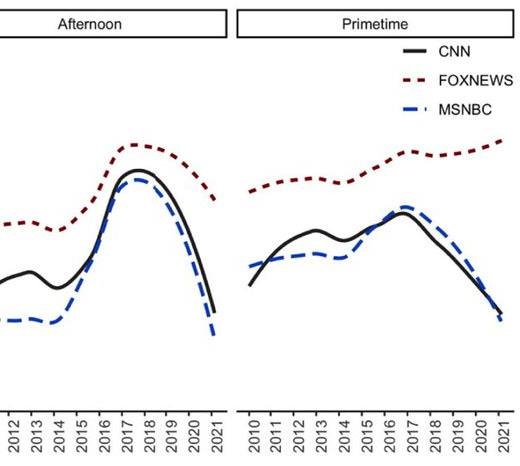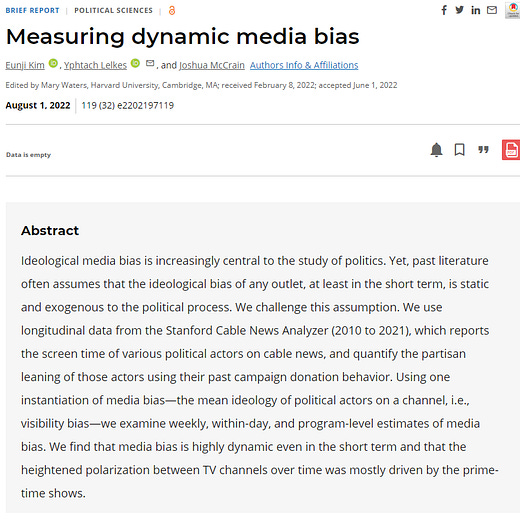Best of #econtwitter - Week of August 7, 2022 [2/3]
Aug 10, 2022
Welcome readers old and new to this week’s edition of Best of Econtwitter. Please submit suggestions — very much including your own work! — over email or on Twitter @just_economics.
This is part two of three.
Paper summaries

Brad Shapiro@btshapir
New working paper!
"Estimating the Value of Offsite Data to Advertisers on Meta," with Nils Wernerfelt, @tuchmanna & Robert Moakler
We ask, "how much would it hurt advertising efficiency if Meta couldn't use 3rd party data for ad targeting?"
papers.ssrn.com
Estimating the Value of Offsite Data to Advertisers on Meta

6:47 PM · Aug 1, 2022
38 Reposts · 140 Likes

Brad Shapiro@btshapir
Under business as usual (using purchase optimization), the median cost per incremental customer is about $44. When advertisers can only optimize for onsite ad clicks, the cost per incremental customer rises by $16 for the median advertiser.
Yikes! Major efficiency loss!
6:47 PM · Aug 1, 2022
9 Likes
^cf: “rename ‘online advertising’ to ‘small business customer discovery and economic growth technology’”

Tommaso Porzio@PorzioTommaso
Short 🧵 on new NBER WP “Labor Misallocation Across Firms and Regions”.
The context: a giant literature has shown that frictions to labor mobility across space lead to spatial misallocation - simply put, some people are stuck in locations where there are no good jobs for them. 1/

NBER @nberpubs
How labor mobility costs decrease aggregate productivity: they shield low productivity firms from competition, increase local monopsony power, and misallocate labor, from Sebastian Heise and @PorzioTommaso https://t.co/OAAdIrR8vQ https://t.co/2AYGb8LN2t
5:36 AM · Aug 3, 2022
54 Reposts · 265 Likes

Lukas Freund@_LukasFreund_
❓How unequal is consumption between the top 0.01% and the median adult, before/during/after lockdowns?
👉How to answer this + many other Qs using granular bank transaction data from Spain in this paper by Carvalho et al.
❗️Amazing what 3bn transactions can shed light on
🧵

CEPR @cepr_org
New CEPR Discussion Paper - DP17519
National Accounts in a World of Naturally Occurring Data
G.Buda @bse_barcelona V.Carvalho @CamEcon S. Hansen @ImperialBiz @alvaroortiz1968 @TomasaRodrigo @BBVAResearch J. Mora @EdinburghUni
https://t.co/BUzy7wz6Cy https://t.co/tOsyKvus14
1:45 PM · Aug 6, 2022
40 Reposts · 117 Likes

Morten O. Ravn@MortenORavn
Thrilled to see this joint paper with amazing co-authors @alagerborg1 and Evi Pappa come out!
Here's a thread about what we do.
1/n

The Review of Economic Studies @RevEconStudies
Do autonomous changes in consumer sentiments have macroeconomic impact? Lagerborg, Pappa and @MortenORavn find that the answer is yes, and that deteriorating sentiments are recessionary especially in terms of the impact on the labor market.
https://t.co/P8aaBxLcqk https://t.co/JsdgdQY9xA
4:51 PM · Jul 28, 2022
30 Reposts · 146 Likes

Andrew Chen@achenfinance
The 200+ stock market “factors” are all just trivial variations on value, momentum, and a couple other factors, right? Jack McCoy (PhD student @Columbia) and I add new evidence that the answer is a hard no. (1/4)

8:28 PM · Aug 1, 2022
14 Reposts · 69 Likes

Josh McCrain@joshmccrain
New in @PNASNews with @ylelkes and @eunjikim_media:
Measuring dynamic media bias
Examining cable news from 2010-2021, we find bias varies over time within and across:
- channels
- program times (afternoon/primetime)
- shows
pnas.org/doi/10.1073/pn…


8:26 PM · Aug 1, 2022
63 Reposts · 219 Likes
^the measurement issues here look “challenging” to say the least

Francesco (Ciccio) Amodio@fscoamodio
📢 New WP paper alert!
@pame_medinaq @mmorl89 and I study how self-employment opportunities shape the market power of employers in low-income countries, and its implications for industrial policy.
Link: drive.google.com/file/d/12PgVus…
A thread 🧵 1/n

9:57 AM · Aug 5, 2022
65 Reposts · 262 Likes
Interesting discussions

Chris Blattman@cblatts
Your annual reminder that the American Economic Association is not a democracy

12:29 PM · Aug 1, 2022
20 Reposts · 195 Likes

Chris Blattman@cblatts
Several colleagues have explained the reasons behind this, which I do not dispute. e.g. Eminent economists would not run for President if they had to compete. That seems plausible. That doesn’t mean the outcome is worse. We really are one of the most elite captured disciplines.
12:31 PM · Aug 1, 2022
3 Reposts · 71 Likes

Chris Blattman@cblatts
My other foot is planted in political science, which is dysfunctional in probably the opposite way. I’m honestly not sure which outcome I would choose if forced. But on process grounds I have to stand with the more participatory profession.
12:32 PM · Aug 1, 2022
1 Repost · 45 Likes
And via MR:

Jonathan Eyer@jonathaneyer
I am running as a write in candidate! The top 1% of economists control 99% of the data.
My promise
1. Universal Basic Instruments
2. Close P&P loophole
3. 15% min acceptance rate
4. Require FOIAd data be made public
5. Ban macro

Chris Blattman @cblatts
Your annual reminder that the American Economic Association is not a democracy https://t.co/dpcn22VBfl
1:19 PM · Aug 1, 2022
18 Reposts · 194 Likes

Gabriel M Ahlfeldt@Ahlfeldt
Wow, congrats to our colleagues from @JPubEcon; what an amazing rise in impact factor. #EconTwitter: What is behind this success story?

6:20 PM · Aug 6, 2022
4 Reposts · 108 Likes

Austan Goolsbee@Austan_Goolsbee
@Ahlfeldt @JPubEcon Almost certainly their fast track refereeing of COVID papers. It was a brilliant move—people opted for quick process at J Pub E > slow roll somewhere else. For ppl old enough to remember, Larry Katz used that template to supercharge the QJE back in the day.
3:33 PM · Aug 7, 2022
1 Repost · 27 Likes
^citation counts for authors & journals are broadly screwed up (in econ) now thanks to covid papers — due to cross-field citations, it seems? — it’s incredible, and doesn’t seem to be much discussed

Daniel M. Smith@ProfDanSmith
'Tis the season for job-market advice. To mix it up, here are 10 super-basic tips for male candidates about the hidden *fashion* curriculum. For fun (YMMV)---but also, yes, it might matter (signaling of various sorts), and men seem to need more help on this than women. 1/12
5:42 PM · Aug 6, 2022
49 Reposts · 322 Likes

Francesco Trebbi@xftrebbi
Political Economy has now a JEL code. aeaweb.org/econlit/jelCod…
We are code "P".
We thank the AEA @AEAInformation @AEAjournals for engaging with the @nberpubs POL members. But particular thanks have to go to @renee_bowen_lyn a leader in our field who made all this really happen.
aeaweb.org
American Economic Association: JEL Codes

11:01 PM · Aug 4, 2022
87 Reposts · 520 Likes

